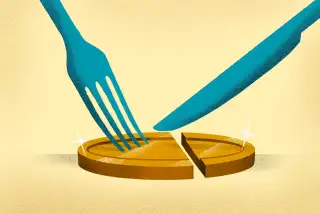5 Easy Ways to Save Money Everyone Should Know

So you moved into an apartment where the rent is higher than you're used to. Or your favorite artist just announced new tour dates. Maybe you developed a taste for Kobe beef.
No matter the reason, you've found yourself in a situation where you need to save an extra $100 or so a month. Well, you're in luck — saving money doesn't have to be hard, and it doesn't necessarily require a drastic change to your lifestyle.
Here are five expert-approved cost-cutting measures to help you pinch pennies without feeling restricted.
Look for found money
The first step is to figure out where your money is going right now. Jody D’Agostini, an advisor with Equitable Advisors, says to create a budget of your monthly expenses to nail down your spending patterns — determine how you're currently using your income so you can decide what behaviors you want to change. D’Agostini says you can do this with a tool like Mint, an Excel spreadsheet or “even a good notebook.”
“Sometimes you don’t realize how much you’re spending in whatever category,” she adds. “Perhaps it doesn’t mean that much to you, particularly if you want to reprioritize to be able to save more ... it’s kind of found money.”
Reduce housing costs
Housing can be a colossal expense, so it’s a natural starting place when looking for chances to save. D’Agostini suggests people take advantage of the unusually low mortgage rates and consider refinancing. If you've got an extra room, you may want to get a roommate who can split the rent with you.
Another way to save money is to swap out your light bulbs for energy-efficient ones. D’Agostini says it may be worth it to invest in LED lights or Compact Fluorescent Lamps, also known as CFLs. CFLs are 75% more efficient than incandescent bulbs, leading to a potential savings of $198 for the average household over the course of a year, according to investment research firm Zacks.
You should also remember to unplug appliances when not using them so you don’t pay for any residual power.
Cook at home
Evaluate how much money you're spending on eating and ordering out and decide whether the experience you're getting is truly worth the cost. Sometimes it is, but Luis Hernandez, assistant vice president and wealth advisor at Frost Bank, says often meal-planning is the way to go. Reddit’s r/budgetfood community is full of cheap recipe ideas.
On that note, when you're grocery shopping for ingredients, you should always take a list instead of winging it.
“Come in with your list and go out with what you need rather than grabbing something you didn't need because it looked yummy on the way out,” D’Agostini says.
Shop smarter
Speaking of food, D’Agostini says to make sure you're maximizing any credit card rewards. Those cash-back promotions can snowball into big savings, but you don’t want to get too swipe-happy: “Paying in cash can help, too,” she says, because it triggers “more of a psychological ‘Oh, that’s what it costs.’”
In addition to shopping at thrift stores and discount retailers like TJ Maxx or Ross, you should schedule big purchases around holiday sales. If you're looking to buy a mattress or furniture, Presidents Day is probably best for bargains; for a laptop or TV, Black Friday may be the ticket.
D’Agostini suggests shopping in bulk and making a point of buying generic instead of brand-name products whenever possible. Although their names may be funny — “Crispy Hexagons,” anyone? — generic items are often exactly the same as the official ones.
Trim existing bills
It’s always smart to shop around for insurance. D’Agostini says to reassess your health care plan annually, taking note of what the co-pays are and whether your doctors are covered. Bundling home and auto insurance may lead to savings, as well.
No matter the company, you should ask whether there’s a discount for going paperless and handling your account completely online. You can also call the customer service line and attempt to negotiate down your bill — or have someone do it for you.
Hernandez recommends canceling any unused or forgotten subscriptions, too.
These little ways to save add up fast, leading to increased savings without a decreased quality of life. As you're doing all of this, you should also automate your savings. If you do that and pay close attention to your savings goals, you should land on the right track.
“If you're realizing some vision, if you're committing yourself toward something, it works a lot better,” D’Agostini says.
More from Money:
How to Build Credit Fast and Earn a Good Credit Score
How Much Should You Have Saved by 30? Here's Some Surprisingly Reassuring Expert Advice
The Secret to Saving the Perfect Amount of Money Every Time You Get Paid